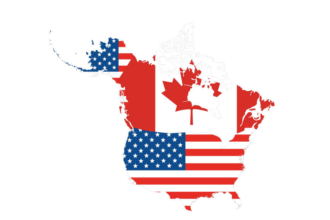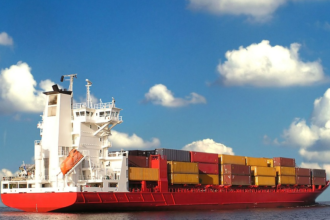Following his most recent action to apply import taxes on steel and aluminum entering the US, US President Donald Trump has promised to impose more tariffs. Strong reprisal from the European Union (EU) and Canada following his decision has escalated the continuous trade conflict.
Trump claimed that “of course” he will respond to the countermeasures, renewing his promise to put “reciprocal” tariffs next month on countries globally.
“Whatever they charge us with, we’re charging them,” he said.
With worries over the effects on economies and consumers, especially those in the US, this most recent increase in trade war hostilities has shook global markets. Analysts warn that such trade disputes could lead to prolonged uncertainty, reduced investor confidence, and disruptions in global supply chains.
What specifics define the new tariffs?
Trump carried out his intended increase in US tariffs on steel and aluminum on Wednesday, imposing a 25% duty overall and thereby terminating prior exemptions offered to select nations. This action corresponds with an earlier sequence this month whereby tariffs on Chinese goods into the US reach at least 20%.
Trump has also threatened to impose tariffs—taxes applied to imported goods—on a range of specific items, including copper, lumber, and cars. According to US officials, the purpose is to shield American businesses and jobs from international competition. Critics counter that by increasing US businesses’ manufacturing costs and driving consumer prices higher, these steps will eventually backfire.
What have the EU and Canada done?
Leaders in Europe and Canada denounced the new metal tariffs as unwarranted and reacted quickly with their own taxes on US imports.
Beginning Thursday, Canada said it would tax around C$30 billion ($20 billion; £16 billion) worth of US goods, including sports equipment, laptops, and steel, 25% levy imposed on Emphasizing the imperative of defending national businesses and employment, Canadian authorities said they had no choice but to react in kind.
Although Prime Minister-designate Mark Carney said he was ready to negotiate a new trade agreement with Trump, he underlined the need for “respect for Canadian sovereignty.”
Meanwhile, the EU stated it would hike its tariffs on up to €26 billion ($28 billion; £22 billion) worth of US imports, including boats, bourbon, and motorbikes, starting April 1. European officials said they regretted the escalation but stressed that remedies were necessary to protect European industries.
European Commission President Ursula von der Leyen indicated that the response was intended to be “strong but proportionate,” adding that the EU was “ready to engage in a meaningful dialogue.”
Tariffs are taxes. They are detrimental for consumers and bad for business; she warned that the economic upheaval would endanger employment and cause inflation. “Nobody needs that—on both sides, neither in the European Union nor in the United States.”
How Will These Tariffs Affect American Industry?
Long term, Trump has claimed he wants to increase US aluminium and steel output. However, critics warn that, in the short term, the tariffs will increase costs for US consumers and slow economic growth.
Major packaged food companies, including Quaker Oats and Folgers coffee, have urged Trump to grant targeted exemptions for imports such as cocoa and fruit, according to a letter seen by Reuters. Other businesses including PepsiCo, Conagra, and J.M. Smucker has also asked for exemption for ingredients not readily accessible from US sources.
Reuters reported that coffee, cereals, cocoa, spices, tropical fruit, and tin mill steel—used in several culinary and household products—were among the imports deemed unavailable domestically. Industry leaders warn that increased costs for such imports could result in price hikes for consumers.
The import taxes are expected to lower demand for non-US-made steel and aluminium, so hurting foreign metal producers. While the US is the destination for about 90% of Canada’s steel and aluminium exports, the EU calculated that the most recent US tariffs affect around 5% of its total exports to the US.
Many economists contend that since retaliatory tariffs from other countries make it more costly for American businesses to export goods overseas, a protracted trade war might negatively impact US enterprises. The possibility of reduced exports and higher input costs for manufacturers has raised concerns about potential job losses in affected industries.
How have financial markets responded?
Following the tariff announcements, US stock markets showed mixed results on Wednesday. The Dow dropped 0.2% while the S&P 500 ended over 0.5% higher following two days of significant falls. The Nasdaq increased by 1.2%.
Concerns about the long-term effects of the trade war have been voiced by investors, especially with relation to corporate profits and world economic stability. Market analysts note that further escalation could lead to increased volatility, as businesses and investors attempt to navigate the uncertainty created by fluctuating trade policies.
In what ways might these tariffs impact world supply chains?
The ripple effects of the trade war reach beyond the US and its immediate trading partners. Many multinational organizations rely on complicated global supply chains that span numerous countries. Increased tariffs can disrupt these supply chains by making raw materials and components more expensive, leading to higher costs for manufacturers worldwide.
The automotive sector is especially vulnerable, for instance, since many manufacturers source components from other nations before building automobiles in the US, Europe, or Asia. Higher tariffs on imported goods including steel and aluminum could compel manufacturers to either absorb the expenses or pass them on to consumers via more expensive vehicles.
Retailers, too, may feel the pinch, as many consumer goods sold in the US are manufactured overseas. Tariffs’ increasing cost of imports could lead to higher prices for common goods including electronics and household items, influencing consumer spending.
Will Trump retreat on his trade policies?
During an appearance at the White House with Irish Prime Minister Micheál Martin, Trump confirmed his commitment to the trade war, stating he was “not happy” with EU trade practices.
He mentioned worries about rules he claimed harmed US agricultural products and cars as well as legal penalties Apple was subjected to. “They’re doing what they should be doing perhaps for the European Union, but it does create ill will,” he remarked.
Later on, Trump said, “We’re going to win that financial battle,” after threatening taxes on European automobiles.
Trump has shown no sign of softening his tough trade posture in face of growing criticism. His administration contends that these actions are required to win better trade agreements and level the playing field for US firms. However, as tensions continue to rise, businesses, policymakers, and global markets await further developments in this escalating trade war.
With no clear resolution in sight, the situation remains fluid, and the ultimate economic consequences of these tariffs—both for the US and the global economy—are yet to be fully realized.








